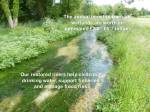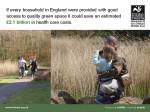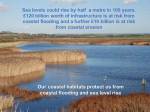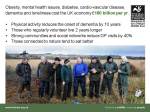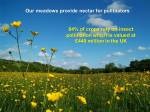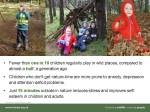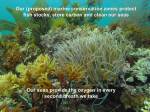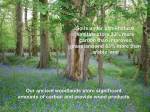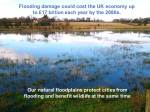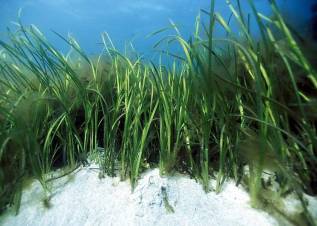New blog posts can now be found here http://www.hiwwt.org.uk/blog/hiwwt-ceo
My blog is moving….
My blog will soon be moving to its new home on the HIWWT website. The address is www.hiwwt.org.uk/blog/hiwwt-ceo where you can sign up for email alerts.
If you do subscribe to this wordpress blog, I hope I can encourage you to subscribe to the new one, as this one will close soon.
Thank you!
******
Climate change and our wildlife
We already know that climate change will have a wide range of impacts on our wildlife, including changing the extent of habitats, the chemistry of our seas, and most notably a change in the distributions of various species. We’ve already seen some species like willow tit moving northwards through the UK probably in response to changing climatic conditions in the south …..
Read the rest of this post and sign up to the new blog here http://www.hiwwt.org.uk/blog/hiwwt-ceo/2015/07/29/climate-change-and-our-wildlife
#DefendNature
Across Europe, including here in the UK, crucial nature laws protect our most precious wildlife. Together these ‘Nature Directives’ protect a network of wild places stretching across Europe. For over 30 years they have protected some of our best loved and most iconic landscapes. Some 800 of the UK’s special habitats – like the ancient woodland and heathland in the New Forest, the migratory birds in the Solent and Southampton Water and the iconic chalkstream habitats of the River Itchen – benefit from the protections they offer.
At Hampshire & Isle of Wight Wildlife Trust, we’ve found that these nature laws are essential in for example, stopping damaging developments like the proposals to build a new container port at Dibden Bay near Southampton, which threatened breeding habitat for coastal birds, and in protecting species from near-extinction like the otter.
It’s not just wildlife that depends on this legislation – we do too, for cleaner rivers and seas, for the vital habitats that support pollinating insects and for the natural places we can enjoy and spend time in. Without these laws our world would be a much poorer place.
Right now European Leaders are reviewing the Directives and asking people to give their opinion on them. There is concern among many charities that the review could be hijacked and protection for nature could be weakened under the guise of helping economic growth.
However a strong natural environment is the foundation for a functioning economy. It’s estimated that the network of wild areas these laws protect creates some €200-300bn worth of economic benefits per year to local economies. What’s more, undermining the protections for nature will just create more uncertainty over things like investment and development.
Moreover, the laws protect wildlife while encouraging ways of people and nature to live together in and around some of our most iconic landscapes. They’re good for wildlife, people and the economy.
Some two thirds of the UK’s species have declined over the last half century from loss of habitat already – and now climate change is threatening the survival of those that are left. So it’s vital that as many of us as possible say that we feel strongly about this and don’t want to see these laws weakened.
The Wildlife Trusts have joined 100 other charities and environmental organisations across the UK to help people respond to the consultation in support of the Nature Directives. This is to help send a clear and consistent message to the European Commission that people feel strongly about this, wherever they live.
We can’t let them roll back years of progress – to let them know your views visit: www.wildlifetrusts.org/defendnature before 24th July.
Please share this campaign with your friends and family. Use #defendnature, #naturealert and our campaign link: http://wtru.st/defendnature
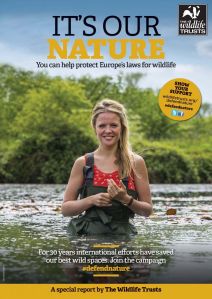 > Read our ‘It’s Our Nature: You can help protect Europe’s laws for wildlife‘ report to find out more.
> Read our ‘It’s Our Nature: You can help protect Europe’s laws for wildlife‘ report to find out more.
> Read our blog – Joan Edwards looks at what the Nature Directives do for people and wildlife here in the UK.
> Read the joint media release
> Read more background on the consultation from the European Commisson
*****
Rubbish benefits for wildlife and communities
The Government is looking at reforming the ‘Landfill Communities Fund’, a national grant pot for community and wildlife projects.
The funding comes from ‘green tax’ on rubbish sent to be buried in landfill sites. In principle the landfill tax is a good thing, as it encourages recycling and reduces our contribution to climate change and it’s potentially catastrophic impacts on wildlife.
But the added bonus is that the money is redistributed to local environmental projects, including in many Hampshire and the Isle of Wight.
Over the last 2 years alone, over £105,000 from the Landfill Communities Fund has supported a range of wildlife projects we at Hampshire & Isle of Wight Wildlife Trust are involved in.
This includes a 2 year restoration programme at Sandown Meadows Nature Reserve on the Isle of Wight. Owned and managed by HIWWT, this site, and others in the valley are being restored with a £50,000 grant from the Local Communities Fund via Biffa.
Riverside trees have been coppiced to encourage lush growth of bankside vegetation that will benefit a range of species including water voles, dragonflies and kingfishers. Over the past year volunteers have put in a tremendous amount of time and effort helping to restore an old floodplain pond that is now attracting a range of wildfowl like shoveler, snipe and mallard. Thanks to the funding, we were also able to remove the non-native invasive Parrot’s Feather plant from the ditches.
Given the Fund’s huge importance to community environmental projects such as the one at Sandown, it’s hardly surprising that many organisations like the Wildlife Trusts are very concerned about current government plans to ‘reform’ it.
There are growing fears that vital funding for these community projects will be reduced or removed under the guise of the Fund being ‘inefficient’. While the process could be better at getting more money to more community projects more efficiently, getting rid of it altogether shouldn’t be on the table.
Any reduction in this already over-subscribed fund will hit community environmental projects hard. Currently everything from footpaths in nature reserves through to new inner-city playgrounds are only being delivered because of this fund. And potential cuts to the Fund are even more concerning at a time when government spending on wildlife-rich green spaces is expected to fall across the board over the coming years.
We’re also concerned about government proposals to only fund short term projects. We know that what wildlife really needs right now is long term investment and protection. Planning for the future is the only way we’ll put nature on the path to recovery.
That’s why we at Hampshire & Isle of Wight Wildlife Trust are responding to the government consultation on the Landfill Communities Fund, calling on them to keep this lifeline for community environmental projects.
**If you would like to respond to the consultation, you can read more on the government website, and email your views to Landfill-tax.consultation@hmrc.gsi.gov.uk by 10 June 2015**
Finally, my blog will shortly be moving to a new home to on Hampshire & Isle of Wight Wildlife Trust’s website.
So for my latest views on working in nature conservation in Hampshire and the Isle of Wight, and wider conservation issues in the UK, subscribe to my new blog here.
*****
The outlook for wildlife post-election
Now that the new Government has taken office, wildlife charities like Hampshire & Isle Wight Wildlife Trust are assessing what the future holds for wildlife in the UK.
Environmental and wildlife issues have been noticeably absent from recent political debate. Most of our decision-makers’ focus is on the economy – despite the clear links between helping nature and helping ourselves; Natural England estimated that more wildlife in our towns and cities could save the NHS £2.1bn a year through improving our mental and physical wellbeing.
In the run-up to the election, and with the help of thousands of our supporters, we asked every political party to commit to protecting nature. Together with over 20 other charities and our supporters, we called for a new ‘Nature & Wellbeing Act’ to protect and restore nature for wildlife and for people. Along with the other political parties, the Conservatives adopted some of our recommendations in their manifesto, including:
- Work with the Natural Capital Committee (England’s independent body advising the Government on sustainable use of England’s forests, rivers, atmosphere, land, wildlife and oceans) to put an economic value on the environment – and introduce a 25 year plan for restoring nature and biodiversity;
- Improve people’s access to the outdoors by providing free, comprehensive maps of all open-access green space – and launching an ambitious programme of pocket parks (small areas of inviting public space where people can enjoy relief from the hustle and bustle of city streets);
- Complete the network of Marine Protected Areas around the UK.
We will be among those organisations and supporters looking forward to seeing these pledges implemented, although we hope this isn’t all this government will do for our wildlife. The government’s wider plans will become clearer over the coming weeks.
This week’s Queen’s Speech gave us some clues of what to expect. We welcome the commitment to take climate change seriously at the UN Climate Change Conference in Paris at the end of the year. Climate change continues to pose a major threat to both wildlife and people, as well as the economy. It is essential that firm action is taken to prevent biodiversity loss – and we’d like to see further investment in nature to mitigate the impacts and costs of climate change.
The government has committed to an in/out EU referendum, the negotiations for which could throw further doubt over the vital nature protection laws that the European Commission is already reviewing. We’d also want reassurances that the government pledge to reduce regulation for businesses won’t weaken key protections for and responsibilities to wildlife.
Broadly we hope to see nature truly placed at the heart of decision-making, giving it the prominence it deserves; however there is also a risk that we may see some damaging wildlife and flooding policies, like those that earned the last government a ‘red card’ for poor environmental performance from the Environmental Audit Committee.
Today’s news coverage that David Cameron still hasn’t appointed a minister for the natural environment doesn’t signal any great priority for this critical area which is highly disappointing.
The Wildlife Trusts are among the many wildlife charities awaiting the government’s legislative plans with anticipation. We are ready to make the case for protecting nature – for wildlife, and for people.
*****
Natural Fixes – how nature can help solve some of society’s big problems…
At a time when nature is under greater threat than ever, our need for it has never been more important.
As an ecologist, I’ve been immersed in the nature conservation world for more than 20 years. For me, the importance of nature is paramount and obvious, but it is easy to forget just how unimportant and irrelevant nature is (apparently) to most people compared to issues such as the economy.
However, things are changing. Last year’s floods, the obesity crisis, increasing awareness of mental health issues, concerns about food security and animal welfare, and the impact of climate change are now mainstream issues – and every one of these has an important link with the nature conservation agenda.
The economic and social costs of climate change, environmental pollution and biodiversity loss will be (and are already) significant. Climate change could cost the equivalent of losing 5% of GDP each year, now and forever. But natural habitats can play a major role in mitigation.
Obesity, mental health issues, diabetes, cardio-vascular disease, dementia and loneliness cost the UK economy £180 billion per year. But contact with nature can have far-reaching benefits, helping to significantly reduce those costs.
Our wealth as a nation and our individual wellbeing depend critically upon the natural environment. Nature provides us with the essential ecosystem services, goods and products needed for life – like drinking water, clean air and food.
OUR PROPOSITION
- Nature is the solution to many of society’s problems
- Nature and ecosystems provide multiple benefits to our economy, health and wellbeing
- Nature mitigates the impacts of climate change
- Our lives are so much better with wildlife in them
But we need to invest in its recovery.
A shocking 97% of our wildflower meadows are gone; 77% of our precious chalk streams are in poor condition and 60% of all species are still declining. Nature cannot support us if we continue to use and abuse it.
There are those who argue that we cannot and should not put a price on nature. I do share those concerns and for me, the intrinsic value of wildlife is enough. It is truly priceless. There are risks with trying to value nature especially using our flawed economic system which we all know is at the heart of many of our issues today.
However, I have found that using some hard facts and figures – such as those in the slides below – can be a very powerful way of showing some audiences how important nature is and how important it is for us to invest in it…
- Benefits of rivers and wetlands
- Benefits of access to nature
- Benefits of coastal habitats
- Health benefits from nature
- Benefits of meadows
- Children and nature
- Benefits of marine habitats
- Benefits of woodlands
- Benefits of floodplain habitats
*****
The Wildlife Trusts and the RSPB are calling for a Nature and Wellbeing Act (read more here) which would put a duty on government to invest in nature’s recovery for its own sake and for the sake of our wellbeing. You can support this idea here – and follow the conversation on twitter using #actfornature
*****
No we haven’t forgotten the birds – or the wildlife
So, there’s a new campaign attacking the RSPB (and the Wildlife Trusts) called You Forgot The Birds. Criticising spending on anything other than “building bird habitat” Sir Ian Botham and his shooting friends Sir Johnny Scott and Martyn Howat levy a barrage of complaints on their website, youforgotthebirds.com
These three fans of field sports challenge the effectiveness of the various conservation groups at helping bird life to thrive. They ask “Who actually builds bird habitat?” “And who is just talk – great at fundraising but doing little real conservation?” They also state “We are going to examine the accounts of the RSPB and all the 47 Wildlife Trusts and get you the facts.”
I’ll save YFTB a job and say now that Hampshire & Isle of Wight Wildlife Trust spent 86% of our total expenditure on our charitable objectives of conservation and education last year, we manage 11,000 acres of land for wildlife in the two counties and 97% of our nature reserves are in favourable or recovering condition. Each year we successfully deliver a whole host of projects as you can see from our Annual Report below. So I think we can say we are doing real conservation!
Part of the YFTB website criticises the RSPB’s £6m TV advertising campaign and asks “how much more could have been achieved by investing those same millions directly into front-line conservation?” “£6.2m would restore significant amounts of habitat and buy major tracts of land for UK reserves.”
Whilst £6.2m might sound like a lot of money, it would not buy much at all. Average land prices in my part of the world are £10k per acre and so that would buy a measly 620 acres – just 0.0012% of the land surface of the UK – or just 5% of the amount of land managed by Hampshire & Isle of Wight Wildlife Trust. Yes, land is cheaper away from the south east, but even so it is misleading to say it would buy “major tracts of land” – it wouldn’t.
As for advertising, whilst we don’t do that at HIWWT, we do spend money on marketing, advocacy, awareness-raising and membership recruitment – after all with less than 2% of the population as current members, tens of thousands of houses due to be built, wildlife still declining in the wider countryside, and a hostile government, we need to do all we can to put nature higher up the agenda.
Two big decisions for David Cameron – what will he do?
Next week David Cameron has to make a key decision on how to spend £13billion of public money. This huge sum is destined for English farmers through the Common Agricultural Policy and will shape the future of 69% of the English landscape. The question Cameron must answer is: will the money be given to farmers who implement environmentally-friendly practices or will it be handed over as income support with few environmental strings attached?
The choice is between a healthy, wildlife-rich farmed landscape where hedgerows, clean rivers and our much-loved wild plants and animals co-exist with sustainable food production – or a countryside where nature, already greatly diminished, ebbs further into inexorable decline. In May this year, the State of Nature Report revealed that 60% of the species studied have declined over recent decades. Many of these species rely on wildlife-friendly farmland to survive.
The Government has two main decisions to make:
Big Decision 1 – Support for farm environment schemes
Farmers have made significant commitments to delivering farm environment schemes in the last 25 years. These schemes are restoring and connecting important habitats and bringing species back from the brink. They help to protect rivers and streams from pollution and protect habitats that store carbon. But budget cuts agreed in Europe mean these schemes are under threat. The Government wants to put things right and move the maximum amount allowed by Europe (15%) from the budget which supports direct payments to farmers, into the rural development pot (so-called ‘modulation’) which funds these schemes. Not everyone agrees and the Government could change its mind.
We want the Government to stick to its commitment to protect the rural development budget which supports farm environment schemes by making this 15% funding transfer. Once it has agreed its amount for the rural development budget the Government will choose whether to allocate an amount between 78-88% of the rural development budget to farm environment schemes. We want to see the maximum amount possible allocated to environment schemes, providing more space for nature and supporting healthy farmland ecosystems.
Big Decision 2 – Effective actions for the environment on all farms
As well as building on current successes and keeping the farm environment schemes going, more needs to be done in the areas that will not be eligible for such schemes. At best, future environment schemes are likely to cover 35-40% of the country, so other ways must be found to raise environmental standards across the whole of the farmed landscape.
The Government can choose whether or not to improve upon the standard ‘greening’ measures proposed by the EU that farmers will undertake in return for 30% of the direct payments they receive. For example Government could focus on measures that could do more to protect remaining flower-rich grasslands or link habitats strategically across the landscape. The best way for the Government to deliver the ‘greening’ measures would be via a special greening scheme for England.
Please see the Wildlife Trusts news release that was issued on the when the public consultation began: Bees, birds and hedgerows at risk: public must act to protect nature on farms
First wave of marine protection – a good start but not enough
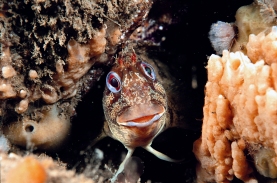 Today the Government announced the immediate designation of 27 new Marine Conservation Zones – arising from the 2009 Marine Act.
Today the Government announced the immediate designation of 27 new Marine Conservation Zones – arising from the 2009 Marine Act.
These are an important first step towards the urgent job of helping our seas’ wildlife and ecosystems recover, so it is good news. However, there were 127 recommended MCZs in total so we will need to continue to press Government to bring more sites forward in further tranches.
After years of neglect and overexploitation the introduction of protected areas to help our seas recover to full health and productivity is long overdue and the Wildlife Trusts are encouraged to hear that there is a definite commitment to make further tranches of designations in the next few years.
It is vitally important that this first step leads on to a complete ecological network of MCZs for the full benefit to our marine wildlife to be realised. Decisions affecting the marine environment affect us all.
Our neighbours in Dorset and Sussex are lucky to have new MCZs in their areas, but unfortunately we lost out locally. None of the recommended MCZs in the Hampshire and Isle of Wight area were included in the first tranche of designations.
We strongly ask for these important and diverse sites featuring nationally important areas of seagrasses and reefs and supporting a tremendous diversity of marine life, to be considered for designation as soon as possible.
For further details of the recommended marine conservation zones we wish to see in the Hampshire & Isle of Wight seas, please click here
~~~~~~~~~~~~~~


